|
9 Western Road
West Street 1878
Deal
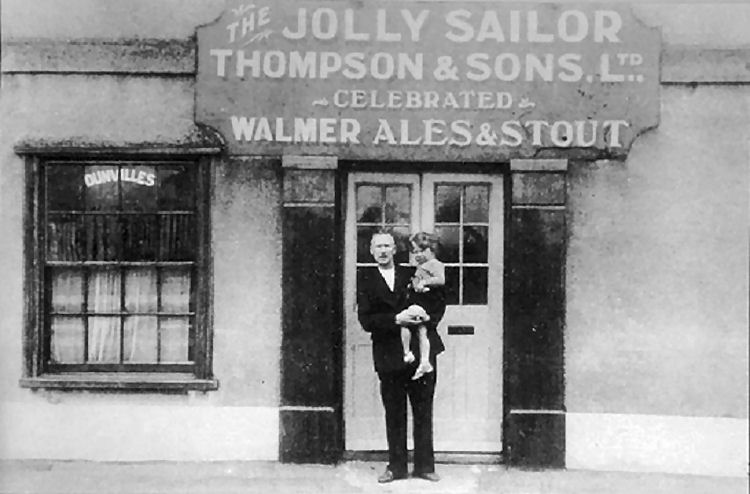
Above photo showing licensee George Neeve holding unknown child circa
1925. Kindly sent by Rory Kehoe. |
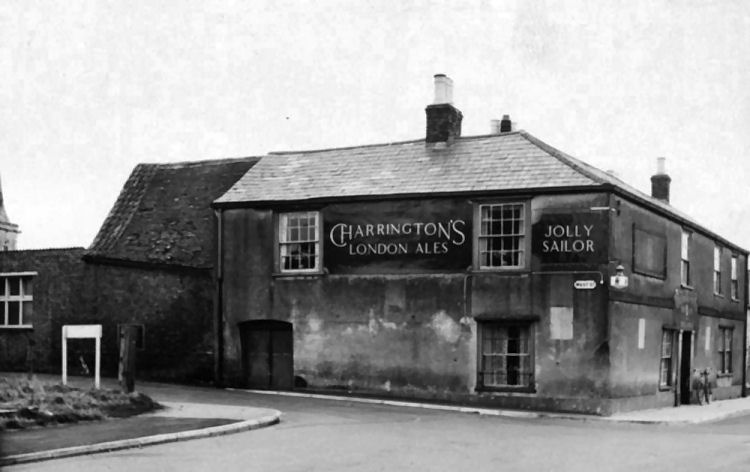
Above photo 1952.
Creative Commons Licence. |
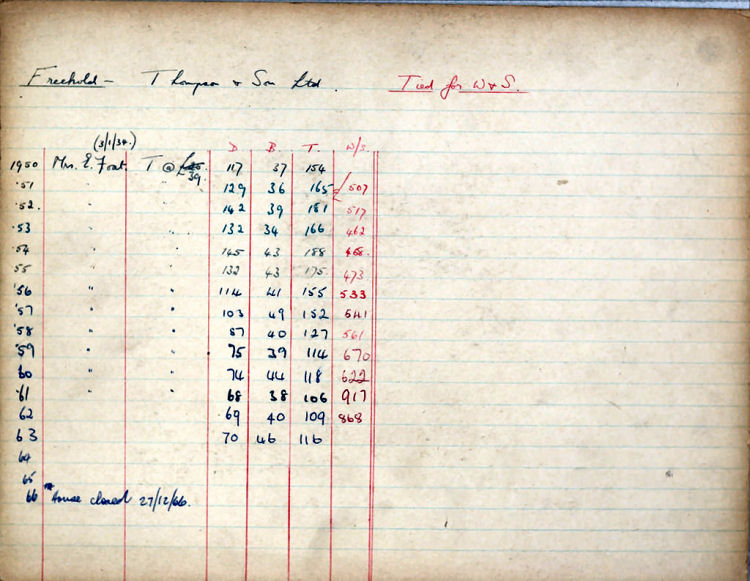
Thompson & Sons ledger.
Creative Commons Licence. |
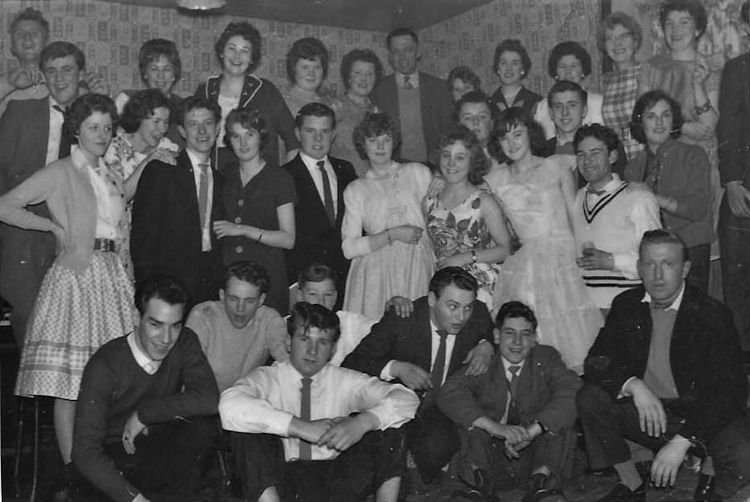
The landlady Mrs Foat (1944-66) welcomes North Deal Football Club in 1959. |
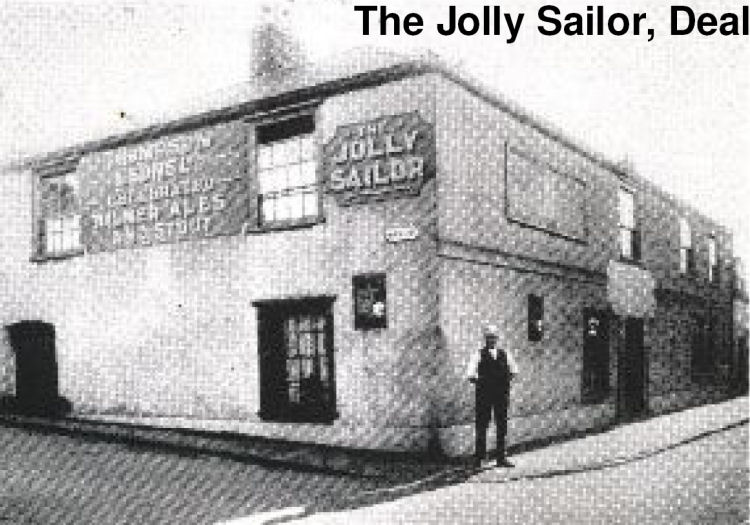
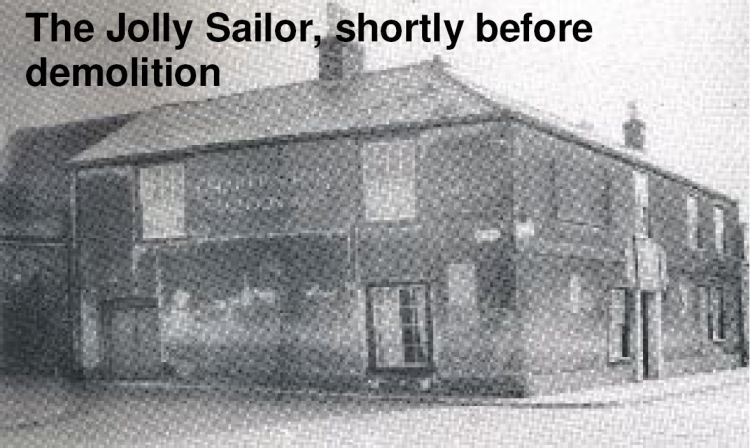 |
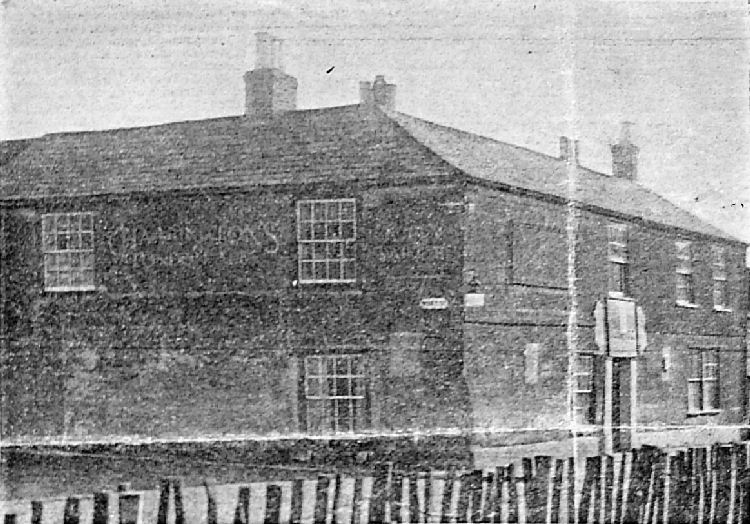
Above picture kindly supplied by Deal library. Newspaper cutting from East
Kent Mercury, Thursday, October 14th, 1965. |
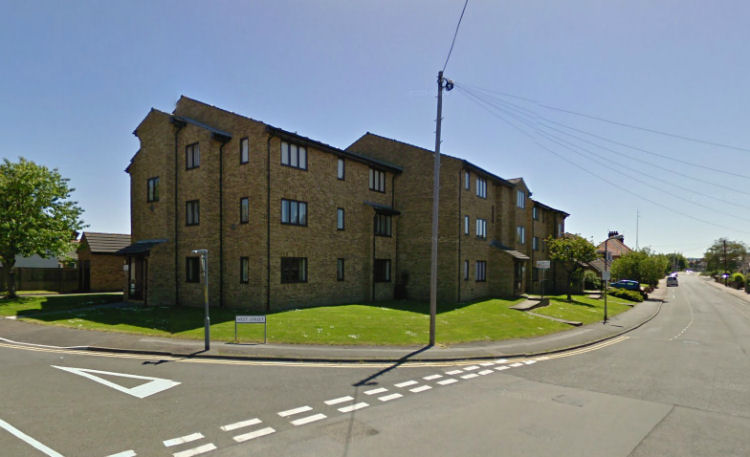
I believe this is the view you would see today. Picture taken from
Google maps, May 2009, of the corner of Western Road and West Street. |
The Kentish Post or Canterbury News-Letter, February 8th 1750 mentions a
"Jolly Sailor" in Deal.
|
From the Kentish Post or Canterbury News-Letter,
February 8th 1750. Kindly sent from Alec Hasenson.
Sale by auction of a House at the Jolly Sailor in Deal, Feb. 8, 1750.
|
The Jolly Sailor stood on the corner of West Street and Western Road in
Deal and was demolished in 1969 to make way for road widening but had been
closed since 1966 due to subsidence caused by the mine workings of
Betteshanger Colliery.
I believe I can trace the pub back to at least 1750 and certainly through
the 1800s with the name of "Jolly Sailor." However, there is evidence that
it changed name to the "Norfolk
Arms" in 1867, this pub was also referred to as the "Duke of
Norfolk" and I have reference in 1889 to that pub changing name back to the
"Jolly Sailor" again.
Its closure, however, had been on the cards for many years and
had first been proposed in 1936, because, according to Peter Foat, son of
its last landlady, there were two other pubs nearby.
The exact age of the pub is uncertain although it was believed to have
been one of the several inns that stood along the 'Ancient Highway' that
joined Upper Deal to Sandwich, and which in former days were likely to have
been involved in smuggling.
Names along the route that come down to us from those days include the "Maxton
Arms", "Noah's Ark", "Halfway House"
(now the "Chequers") and the Jolly Sailor itself. All these along
with the "Queen's Arms" were lodging
houses.
Deal at the time comprised not much more than the area around St
Leonard's Church (Upper Deal) and the streets, lanes and alleyways of the
Middle Street area, and the Ancient Highway, following very much the line of
Church Path, Western Rd. and Golf Rd., ran through the desolate marshlands
and sandhills to the north and west of these settlements. As inns, these
premises would have provided for travellers and for the stabling of horses,
attributes which together with their isolation and proximity to the coast,
made them ideal for the concealing and transporting of contraband, as well
as accommodation for those involved in the trade.
Returning specifically to the "Jolly Sailor," David Collyer, who wrote
about the pub in 2001 and to whom I am indebted for most of the information
in this article, describes it as “a rather gloomy-looking, run down
establishment, always in need of a good lick of paint.” Photographs taken
just before its demolition very much back up this description. They also
suggest that, despite its slate roof and comparatively modern looking
rendering, its origins were of considerable age – the windows being large
sashes, irregularly spaced, and with that next to the door appearing at a
slight angle to the pavement, as might be found with timber frame
construction.
The name change appears to have taken place in the late 19th century, by
which time the disreputable activities of earlier years had largely, if not
completely, ceased. In 1882, with Patrick Harris as landlord, it is recorded
as the "Norfolk Arms," but by 1891 it
was the Jolly Sailor. Peter Foat maintains that the change occurred between
1872 and 1888. Certainly by the end of the century, and being run by first
his grandfather, Grandad Neeve and then his uncle George Neeve it was the
Jolly Sailor. The pub stayed with the family and his parents took it on in
1938 when his uncle moved to the "Magnet"
in London Rd.
Again from photographic evidence it would at that time have been owned by
Thompson's of Walmer, subsequently transferring to Charringtons when the
latter took over the local brewery in the 1950s.
Peter Foat's descriptions of life in a pub before World War II are
fascinating, and portray a different world. 'We had eight to ten bedrooms,
as the inn operated as a doss house, and the old boys who stayed there would
play cards in the back room of an evening. I used to sit in when one of them
had to leave the game, and would sneak a sip of beer from an unattended
glass. By the time I was seven years old I could play all the most popular
card games, even Euchre! We had a large back garden with fruit trees, where
we kept pigs, and the ullage from the bar was used to feed our tomato
plants. There was also a large stable, and a shed where an old recluse was
in permanent residence. I had a little dog named Sailor, who loved to play
football with me and my friends. He was very good at finding money which had
been dropped on the floor of the tap room. He would take this down to the
cellar, which was half concrete and half earth, where he would bury it. I
dug it up and used it as extra pocket money.'
He also recalls the various characters of the time, many of whom appear
to have been contending with serious physical disabilities: One-armed Jack
McKlusky who ran the snooker hall in Middle St., Uncle Ticker who had a
wooden leg and rode a bike with it strapped to the pedal, and One-eyed
Reilly, a knife grinder who used a contraption worked by the back wheel of
his upturned bicycle.
The Second World War found Deal under shellfire and bombing raids. One of
these caused damage to the Jolly Sailor and the family went to stay with
Uncle George at the "Magnet."
'The "Magnet" had its own bowling
green beside it, and I can remember playing in the long grass on the
overgrown bowling green,' recalls Peter. 'The little pavilion still had the
named lockers for the members of Ye Old Deale Bowling Club with their bowls
still inside. There was another bowling green next to the "Bell
Inn" in Robert St.' Some of his memories are less pleasant. Evacuated to
South Wales with his school later in the war he remembers one boy being
called to the headmaster's study to be told that all his family had been
killed by the shelling of the "Park Tavern"
the previous night.
After the war normal pub service resumed at the Jolly Sailor, but with
Peter's mother as sole proprietor, as his father had died in 1944. Meanwhile
his sister and brother-in-law took on the license of the "Five
Ringers" in Middle Deal Road (demolished for three houses a few years
ago).
However, the Jolly Sailor's days were numbered, even though the pre-war
plans for its closure had apparently been abandoned. It survived for another
twenty years before subsidence forced the family to move out: Mrs Foat dying
shortly afterwards. For the next few years it remained boarded up and
neglected, before finally being demolished for the necessities of road
widening.
Above information by Martin Atkins.
|
Kentish Gazette 22 December 1801.
Tuesday was married at Upper Deal church, Captain John Epsly, to
Mrs. Mary Seath, of the "Jolly Sailor," public house, both of the
said place.
|
|
From the Kentish Gazette, 29 June 1810.
MARRIAGE.
June 28, at Upper Deal, Mr. Norris Adams, jun. mariner, of Deal, to
Miss Millgate, daughter of Mr. ---- Millgate, landlord of the "Jolly
Sailor" public-house, Deal.
|
|
Kentish Gazette, 26 October 1852.
Special Court of Petty Sessions.
The Brutal Assault.
Before T. Reake, Esq., Mayor; C. Kingsmill, Esq J. P. George
Hammond, Esq., J. P., and Wm. Watts, Esq., J.P. Amelia Me Artney
deposed:— I was in the "Jolly Sailor" between one and two on Tuesday
morning. The prisoner, John Farrier, came in and asked if I knew
another young woman, and said he meant to kill me before he left the
room. He struck me several times with his open hand, and then took
up a pint glass, and threw it at me, which struck me on the month;
he afterwards threw two more at me, one struck me on the forehead,
and the other over the left temple. Defendant was not drunk. After
the last had struck me he made his escape, before any assistance
came. Two men were in the room at the time, one of them was asleep,
and the other assisted me when I was over. I gave no provocation. I
fell down at last, and came on on a broken glass.
Cross-examined by prisoner:— A tipsy woman came in with you, and
stood over the fire. She helped to wash me when all was over. I did
not hit you with a poker, not anything else.
Alexander Harvey, landlord of the "Jolly Sailor":— I did not know
Farrier was in the house till I met him after the transaction, as I
went to see what was the matter. The girl had just fallen down, much
wounded. There was no poker in the room. On coming out, Farrier said
"I will kill the -----." I did not know whom he meant; he was not
drunk. I took up nearly half a pail of blood.
Sarah Ellis, a married unfortunate, deposed:— I live at the
"Jolly Sailor." I stirred the fire at 10:30, and returned the poker
to my own room, and did not go down until after the transaction.
There was neither fire now poker then.
The prisoner was convicted in the full penalty of £5, and in
default to 2 months' imprisonment, and after which to find two
respectable sureties in £10 each, and himself in £20, to keep the
peace towards all her majesty's subjects, and particularly Amelia
McArtney, for the space of 6 calendar months — failing in this last,
the prisoner will have to undergo a still further and longer period
of confinement.
|
|
From the Deal, Walmer & Sandwich Mercury, 8 September, 1865.
BOROUGH POLICE COURT.
Sergeant Smutherley, of the 7th Depot Battalion, applied to the
Magistrates, for a summons against the landlord of the "Jolly Sailor,"
for refusing to allow the police to enter his house. The summons was
granted.
|
|
From the Deal, Walmer & Sandwich Mercury, 15 September, 1865.
REFUSING TO ADMIT THE POLICE
Alexander Harvey, landlord of the "Jolly Sailor" public-house,
appeared in answer to an information of Superintendent Parker, to show
cause why he refused to admit Police-constable Pain on the 5th
instant, whereby he had become liable to forfeit £10.
James O'Smutherly deposed: I am provost-sergeant of the 6th Depot
Battalion. Between 11 and 12 o'clock on Tuesday night, the 5th of
September, having suspicion that a soldier was concealed in the "Jolly
Sailor," I knocked at the door, but received no answer. I sent for the
police, and Police-constable Pain came. I told him I believe that one of
my men was in the "Jolly Sailor." He knocked at the door, and the
landlord opened an upper window, and said he would see him b________
before he would open his door again that night for anybody. Pain then
asked him if he knew who he was, and he replied, "Yes," and that he
would not open his door. I cannot prove that the soldier was in his
house.
Police-constable Pain fully corroborated the evidence of the former
witness.
The Bench said, as there was no proof that the soldier was in the
house, they should dismiss the case, but censured Mr. Harvey for not
opening his door when called upon by the police.
|
|
From the Kentish Gazette, 19 September 1865.
Refusing to Admit the Police.
Alexander Harvey, landlord of the "Jolly Sailor" public-house,
appeared in answer to an information of superintendent Parker, to
show cause why he refused to admit P.C. Pain on the 5th instant,
whereby he had become liable to forfeit £10.
James O’Smutherly deposed:- I am provost-serjeant of the 6th
Depot Battalion. Between 11 and 12 o’clock on Tuesday night, the 5th
of September, having suspicion that a soldier was concealed in the
"Jolly Sailor," I knocked at the door, but received no answer. I
sent for the police, and P.C. Pain came. I told him I believed that
one of my men was in the "Jolly Sailor". He knocked at the door, and
the landlord opened an upper window, and refused to open his door
again that night for anybody. Pain then asked him if he knew who he
was, and ne replied "Yes," and that he would not open his door. I
cannot prove that the soldier was in the house.
P.C. Pain fully corroborated the evidence of the former witness.
The Bench said, as there was no proof that the soldier was in the
house, they should dismiss the case, but censured Mr. Harvey for not
opening his door when called upon by the police.
|
|
Whitstable Times and Herne Bay Herald 8 January 1881.
INDECENT ASSAULT.
At the Police Court on Wednesday last, Stephen Mockett, aged 19, a
labourer was charged with indecently assaulting Elizabeth Williams, a
little girl eight years of age, daughter of Henry Williams, residing at
6, West-street, Deal, on the premises at the back of the public-house
formerly called the "Jolly Sailor." The details are unfit for
publication. Dr. Mason said that the capital offence had not been
committed. He was of opinion that the child had been roughly and
improperly used. Committed for trial at the Quarter Sessions.
Prisoner pleaded guilty before the Recorder on Friday, and was sentenced
to six months' imprisonment with hard labour.
|
|
From the Deal, Walmer, and Sandwich Mercury,
16 June, 1900. 1d.
A DESPERATE WOMAN
Elizabeth Williams was charged with being drunk and disorderly in
Western Road, on the 11th June.
Prisoner pleaded guilty.
Police-sergeant Curtis deposed that about half-past seven the
previous evening, he saw the prisoner in Western Road. She was drunk,
and making use of bad language. She had a child in a perambulator, and
fearing she would upset it, he called her boy from the field opposite
the "Jolly Sailor," where she was staying, to come and take charge of
it. He did so, and prisoner then made use of worse language, and she
refused to go away, and he had to take her into custody. She then
behaved like a mad woman, throwing herself on to the ground, and he was
obliged to get a horse and cart to bring her to the police-station. The
Town-Sergeant assisted him to get her into the cart, and they were
obliged to hold her down on the way to the station.
Prisoner: yes, they hurt my side and my arm.
Mr. Ramell: You must expect that if you behave in that way.
The Mayor: Did they hurt you, or did you do it yourself?
Sergt. Curtis said he had previously seen prisoner in High Street,
and he had complaints about her throwing the child out of the
perambulator.
The Town-Sergeant said that about half-past seven the previous
evening, some one came to his house, and said that Serge. Curtis was in
a little difficulty in Western Road, and he went to his assistance
immediately, and saw prisoner on the ground struggling with the
sergeant. He could see that he must have his hands full. He saw a cart,
and Sergt. Curtis stopped it, and he assisted him to get her into it.
Prisoner made use of most filthy and abominable language. She tried to
bite Sergt. Curtis himself, and it was no wonder that they had to hold
her down. Her language was something disgraceful.
Sergt. Curtis said that the prisoner had been convicted before, but
not for about two years.
Prisoner: Three years this month.
The Mayor (to prisoner): You will have to go to prison for 14 days,
with hard labour, and perhaps that will give you time to think over your
conduct.
Prisoner: They will have trouble in prison then.
|
|
From the Deal, Walmer, and Sandwich Mercury,
14 July, 1900. 1d.
STOLEN CLOTHING
George Mitchell was charged with feloniously stealing one shirt and
one pair of trousers, value 5s., the property of William Edward Coltenam,
at Deal, on the 6th July.
Prosecutor deposed that he lodged at the "Jolly Sailor" and was a
golf caddie. The previous evening he went to his bedroom and found that
a pair of trousers he had left on the towel rail were missing, and that
a shirt belonging to him had also been taken. He went to the landlady
and informed her of the theft, and she found the things in the
prisoner's bedroom. He valued the articles at 5s.
Elizabeth Hanger said that she was the landlady of the "Jolly
Sailor." From what the last witness said she went to the prisoner's
bedroom and found the clothes near the prisoner's bed. She woke him and
asked him how he came to have them in his bedroom. prisoner told her to
mind her own business, saying that it was nothing to do with her. She
came downstairs, leaving the prisoner to dress, and the police were sent
for and prisoner was apprehended. prisoner was carrying a bundle when he
came downstairs, but she did not know what it contained.
Police-Sergt. Barnes said that a little before 11 o'clock the night
before he was called to the "Jolly Sailor," where he found prisoner
detained by the prosecutor. Prosecutor told him, in the prisoner's
presence, that the prisoner had stolen his clothing. Prisoner made the
remark: "You cannot prove that I did." Prosecutor afterwards handed him
the clothing produced, and said that it had been taken from his bedroom,
and then witness apprehended the prisoner and charged him with stealing
the two articles, the property of the prosecutor. He replied that it was
a lie, and that he had not stolen them. He brought prisoner to the
Police-station.
Prisoner having been formerly charged, elected to be dealt with
summarily, and pleaded guilty to the charge.
Prison was then further charged with stealing one pair of trousers,
one flannel shirt, and one pair of flannelette drawers, value 28s., the
property of Sarah Ann George, on the same date.
Prosecutrix deposed that she lived at, 5 Primrose Terrace, and was
the wife of Edward George. She washed the clothes the previous
afternoon, and hung them on a line in an enclosed yard, about 4 o'clock
the previous afternoon. She saw them there safely at 8 o'clock but at
half-past 8 they were missing. She gave information to the police, and
that morning the clothed were brought to her. She identified them by the
marks on them.
In reply to the Mayor witness said that there was a right-of-way to
the back ways of the houses in the terrace. The ground in which the
clothes were hanging was enclosed with a fence, and it was entered by a
gate which admitted to witness' yard only.
Inspector Ellender said that the articles in question were brought to
the Police-station by the prisoner the previous night. prisoner was
asked if they were his property, and he said that they were. Witness had
previously received information of the loss of his property. The morning
he sent the articles to the last witness, who afterwards identified them
at the station in his presence. He then charged prisoner with stealing
the articles named in the charge, and he replied: "I bought them of a
man last night and gave him 2s. for them." In reply to witness' question
prisoner said that the man was a stranger to him, and that he should not
recognise him if he saw him again.
Prisoner still adhered top the story that he bought the articles from
someone, and pleaded not guilty to this charge.
Prisoner was further charged with stealing 1s. in silver and 9d. in
bronze, 1 serge jacket, 1 serge vest, 1 necktie, 1 table knife, 1
tobacco box, and 1 bradawl, of the total value of 9s., the property of
Frederick Bowditch, on the 6th July.
Prosecutor deposed that he lodged at the "Jolly Sailor," and went to
bed between 8 and 9n o'clock on Friday night. When he awoke, at 6
o'clock the next morning, his coat and vest, and the other things, that
he left in his pockets, were missing. He gave information to the police.
He identified the things in his pockets, produced, with the exception of
the money, as his property, and valued the whole at 9s. He was sleeping
in the same room as the prisoner, as he was in bed before prisoner came
in. There was one other man in the room. He found a metal check that had
been in his pocket of the missing jacket, on the floor near prisoner's
bed, having been, apparently, thrown aside by him as worthless.
Inspector Ellender said that he was present when prisoner was
searched the night before. The tobacco box, knife, and bradawl, and the
money produced were found on the prisoner. From information received
from the last witness that morning he showed him the articles, which he
identified as his property in prisoner's presence. Witness then told
prisoner that he should charge him with stealing the articles, and also
the serge jacket and vest. He made no reply. Afterwards, in cell,
prisoner said that he had the jacket and vest on when he was brought in.
Prisoner said that he had put the jacket and vest under the bench in
his cell, and on the cell being again searched they were found hidden on
a ledge beneath the bench, which had not been known of before.
Prisoner said that he was guilty of taking the jacket and vest, but
not the money.
In reply to the Mayor Inspector Ellender said that prisoner had been
drinking, but he knew what he was about.
The Mayor said that the Bench had decided to convict on the three
charges, and for the first offence prisoner would be sentenced to 14
days' hard labour, for the second to 28 days', and for the third to 14
days', the sentences to run consecutively, making two months' in all.
1s. 9d. of the money found on prisoner was ordered to be handed to
the prosecutor in the last case, the remainder given back to him.
|
This public house finally closed its doors in 1968.
LICENSEE LIST
BROWN Matthew 1804?-40+
      (1828 alehouse) (1828 alehouse)
MILLGATE ???? 1810+
HARVEY Alexander 1861-67+ (age 41 in 1861 ) )

1/9/1867 renamed "Norfolk Arms."
1889 "Jolly Sailor" formerly "Duke of Norfolk"
HANGER William 1891-99+ (age 44 in 1891 ) )
 
HANGER Elizabeth 1900-03+  
NEEVE (Peter Foat's Granddad)
NEEVE George H 1909-38+
    
 (Peter Foat's Uncle)
(Peter Foat's Uncle)
FOAT William Frederick Jn 3/Jan/1934-44 (age 60 in 1939)

FOAT Mrs 1944-27/Dec/66 House closed and cleared.
(Peter Foat was the son of the last landlady.)
https://pubwiki.co.uk/JollySailor.shtml
 From the Pigot's Directory 1823 From the Pigot's Directory 1823
 From the Pigot's Directory 1824 From the Pigot's Directory 1824
 From the Pigot's Directory 1828-29 From the Pigot's Directory 1828-29
 From the Pigot's Directory 1832-33-34 From the Pigot's Directory 1832-33-34
 From the Pigot's Directory 1839 From the Pigot's Directory 1839
 From the Pigot's Directory 1840 From the Pigot's Directory 1840
 From the Post Office Directory 1891 From the Post Office Directory 1891
 From the Kelly's Directory 1899 From the Kelly's Directory 1899
 From the Kelly's Directory 1903 From the Kelly's Directory 1903
 From Pikes Dover Blue Book 1909 From Pikes Dover Blue Book 1909
 From the Post Office Directory 1913 From the Post Office Directory 1913
 Deal Library List 1914 Deal Library List 1914
 From the Post Office Directory 1922 From the Post Office Directory 1922
 From the Post Office Directory 1938 From the Post Office Directory 1938
 From the Deal
Walmer & Sandwich Mercury From the Deal
Walmer & Sandwich Mercury
|







